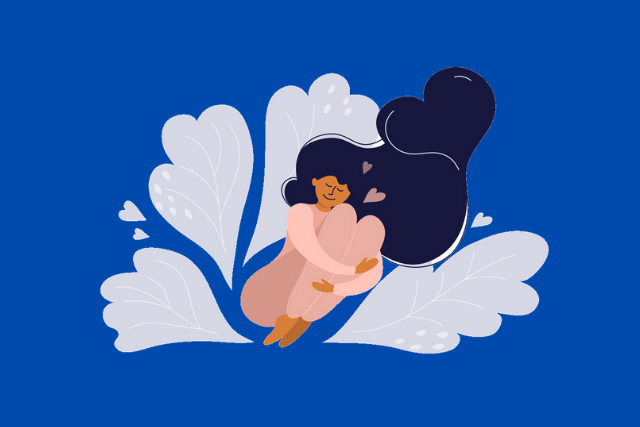
“Quiet the voice telling you to do more and be more, and trust that in this moment, who you are, where you are at, and what you are doing is enough. You will get to where you need to be in your own time. Until then, breathe. Breathe and be patient with yourself and your process. You are doing the best you can to cope and survive amid your struggles, and that’s all you can ask of yourself. It’s enough. You are enough.” ~Daniell Koepke
I remember looking at the nutrition information on the bag of jujubes I had just eaten and feeling utterly and completely disgusted with myself.
That was my first binge. Little did I know how much worse it would get.
It was four days in to the first official diet that I had somehow managed to stay on for more than one day.
I had dieted on and off most of my life, but any time I tried a diet that told me what I was and wasn’t allowed to eat (Atkins was the first of many), I never managed to last longer than a day or two before I’d “blow it” and give up.
Prior to the day of my first binge, I had actually lost a lot of weight on my own, simply by counting calories, but I hired a trainer because, while I reached my goal weight on my own, I still hated my body and wasn’t happy.
So, I did the only thing I knew to do at the time—pay someone else to tell me what to eat so I could have a perfect body and finally be happy.
Ha.
I white knuckled my way through four whole days before I found myself at the grocery store feeling much like I’d imagine a junkie feels as their high begins to wear off. I needed a fix and was jonesing bad.
The next day, I barely ate anything and ran for about two hours to punish myself for being such a pig the day prior.
Within a few months, I was sitting in a therapist’s office hearing him call me bulimic while I bawled hysterically and begged him to tell me how to stop feeling so completely out of control with food.
The harder I tried to control my intake, the more out of control I became.
The more out of control I felt, the worse I felt about myself and treated my body.
Depression, panic attacks, bingeing, and restricting/over exercising (those were my compensatory behaviors) took over my world.
What was wrong with me? I wanted a perfect body so desperately; why couldn’t I just eat what I was supposed to eat?!
I spent a lot of time with my therapist, and he never really gave me answer for what was wrong with me (beyond the eating disorder) or how to fix it.
It just kept getting worse.
My body would shake and I’d be so desperate to get into whatever food I had as fast as humanly possible that I’d usually end up eating an entire large bag of candy on the drive home before continuing to eat until I was sick once I got home.
After awhile I started noticing that it literally felt like a hole in the center of my being that I was frantically trying to fill—unsuccessfully. No matter how much I stuffed in there, it just never ever felt full.
What started with one small bag of candy turned into a monster inside me that I could not control. It morphed from a bag of candy to eating myself sick and ultimately feeling like I was killing myself with food. At my worst, there were nights when I had eaten so much I was legitimately scared I was going to have a heart attack in my sleep and wondered if I should go to ER.
So I started reading everything I could get my hands on. I was desperate—desperate to not eat myself to death, but also desperate to find a way to stop so I could just have that perfect body and finally be happy.
But as I read, I came to realize that my bingeing wasn’t about the food. The over exercising and starving myself to compensate for the bingeing, none of it was about the food or exercise.
And my desperate need to have a perfect body, in order to be happy, wasn’t even about my body.
It all had everything to do with how I felt about myself and my worth as a person.
I hated myself and felt worthless.
I didn’t think I was good enough for anything.
And in that one moment of awakening, everything that was wrong in my life made complete sense.
I finally knew why I was angry all the time—I was in pain.
The starving, restricting, bingeing, and over exercising made sense—I was punishing myself.
The obsessive ways I dove into everything, including food and exercise, were attempts to keep myself numb and not address the pain.
I knew that if I ever had any hope of changing anything, I had to stop chasing the perfect body and start learning to love and value myself, which meant figuring out where the self-loathing and feelings of inadequacy were coming from.
The first thing I had to do in my process of healing, recovery, and growth was to start learning to be forgiving of myself and treat myself with compassion. I had been living with excruciating emotional pain my entire life that I never allowed myself to even acknowledge, never mind deal with.
My constant anger didn’t make me a b*tch or a horrible person; it was a symptom of someone who was hurting deeply.
The initial weight problem that morphed into dieting/disordered eating and ultimately bulimia didn’t make me disgusting or weak; it was a symptom of someone who hated herself so badly she was punishing herself every day.
Those realizations allowed me to start extending myself compassion for those things in me that I wasn’t proud of. They allowed me the space to start healing. Because you cannot change while you believe you deserve to be punished.
I gave myself permission to eat whatever I wanted.
I even gave myself permission to binge, and the weirdest thing happened—I began to do it less and less. Now I cannot remember the last time I binged. It’s been years.
It sounds crazy, like the opposite of what we should do. Permission to binge?!
But when I realized the purpose it was serving and stopped judging myself for it so I could work on actually healing the need it was filling, it all changed.
You see, as long as we’re judging and hating ourselves, we’ll always feel like we’re bad and deserve to be punished. And as long as we believe we’re bad and deserve to be punished, we’ll never stop punishing ourselves.
It came down to five basic mindset switches for me: permission, acceptance, compassion, kindness, and curiosity.
Permission: It’s okay because I’m doing the best I can with what I know right now. When I learn how to better handle these feelings, I’ll make more loving choices for myself.
Acceptance: It sucks pretty bad, but it’s my journey. For whatever reason, whatever I’m supposed to learn from this, this is the journey I’m supposed to be on.
Compassion: How would I speak to a friend or client going through this? That’s how I started trying to speak to myself.
Kindness: The worse I felt, the kinder I was to myself.
Curiosity: I couldn’t just blindly give myself permission to binge forever without actively getting curious about why I was doing it. So, every time it would happen, I’d spend a lot of time asking myself why. How was I feeling? What feelings was I trying to keep myself from feeling? Was there a better way I could manage those feelings?
Alongside making those changes I also worked on learning to love and value myself and change the stories I had been telling myself about who I was and what I was worth my whole life.
So, dieting may have made me bulimic, but my obsession with finding happiness and self-acceptance by building a perfect body led me down a path of learning to love myself and create happiness from within.
I am enough.
And so are you. So give yourself permission, acceptance, compassion, and kindness, and get curious about why you do the things you do. Perhaps, like me, you’ll find this is the key to your healing.
About Roni Davis
Drawing on her own healing process plus over a decade of professional knowledge, education, and experience, E-CET founder Roni Davis guides women through the process of uncovering and changing the thought and behavior patterns that cause weight and food struggles. Her clients break unhealthy eating habits and heal their relationships with food and their bodies while learning to approach their overall well-being from a place of connection, self-trust, compassion, and love. Learn more with her free Why We Eat video series.
- Web |
- More Posts













 Though I run this site, it is not mine. It's ours. It's not about me. It's about us. Your stories and your wisdom are just as meaningful as mine.
Though I run this site, it is not mine. It's ours. It's not about me. It's about us. Your stories and your wisdom are just as meaningful as mine.
This deeply resonated with me. Thanks for sharing your story. It’s almost never about the food or weight! Mindfulness and compassion can help us get through so many personal struggles.
I like the suggestion of mindset switch: permission, acceptance, compassion, kindness, and curiosity as I feel it holds that tension between maintaining an engagement with life and healthy detachment creating space to enter the flow of the moment. Its worth a try.
Thanks
I needed this so much. You are not talking about quick fixes. You sound like someone who has walked the walk and genuinely learned the kind of wisdom we and the country and world needs. Quick fixes are not always there, sometimes more is needed, including a change to ourselves, not the world.
Your article shows so much maturity and hit a topic that hits home with me in particular, as I was bulimic for fifteen years.
How did you implement the mindset switches? I would love to get to where you are but I don’t know how